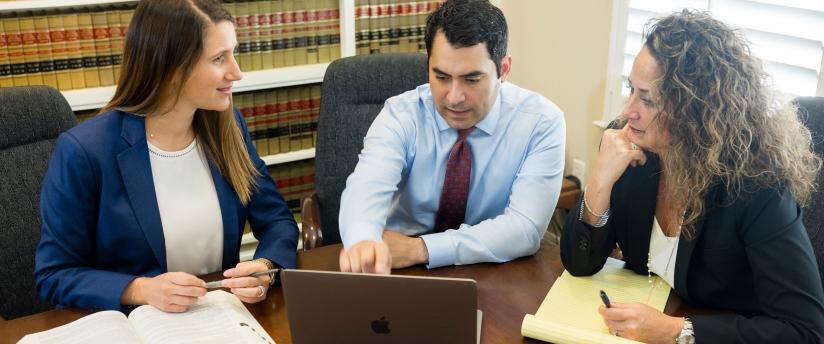How a Sex Crime Lawyer Can Help You Pursue a Better Outcome

If you’ve been accused of a sex crime in Austin, one of the first calls you should make is to an experienced criminal defense lawyer. The prosecutor will likely look to bring the strongest charges with the harshest possible penalties against you to make a statement, so you’ll want to bring an even stronger defense.
Remember that an arrest doesn’t automatically mean that you’ll be convicted or that you’ll have to suffer the harshest punishment allowed by law. A skilled sex crime defense attorney could fight back against the charges you face. The burden is on the prosecution to prove that you were guilty “beyond a shadow of a doubt” to secure a conviction. With a strong defense, it is possible to get the charges against you reduced or dropped, depending on the circumstances of your case.
The outcome of your case is not predetermined. Contact an experienced Austin sex crime defense lawyer to get the help you need and deserve.
What Is Considered a Sexual Offense in Austin, Texas?
According to Chapter 21 of the Texas Penal Code, a sexual offense is considered to be coerced or illegal sexual activity. Minton, Bassett, Flores & Carsey, P.C., defends clients accused of a range of sexual offenses, including:
- Possession of Child Pornography – A person could be charged with possession of child pornography if they intentionally or knowingly possess, or intentionally or knowingly access with the intent of viewing, visual material that visually depicts a minor engaging in sexual conduct, and the person knows the material shows a child.
- Child Molestation – Child molestation is a felony offense. It generally involves sexual abuse, indecency, or contact with a child under 18. The defendant does not have to touch the victim for a jury to find them guilty of the crime. Molestation could involve visual exposure for the offender’s sexual gratification.
- Internet Sex Crimes – Sex crimes that involve the internet range from illegal sexting to child pornography. Unfortunately, some laws don’t protect a person’s right to freedom of speech regarding sexually explicit conversations.
- Online Solicitation of a Minor – Texas Penal Code 33.021 defines online solicitation of a minor as communicating in a sexually explicit manner or distributing sexually explicit material to a minor over the Internet, through a commercial online service, or by text message, electronic mail, or another electronic message system or service. It can also involve soliciting a minor to meet in person via text or electronic mail, over the Internet, or through a commercial online service.
- Prostitution – Prostitution is knowingly offering or agreeing to receive a fee from another person to engage in sexual conduct. Participating in the physical act isn’t the charge someone could face. Promoting prostitution is also a crime.
- Rape – The legal definition of rape is intentionally and knowingly pursuing non-consensual or unwelcome sexual contact with another person that involves penetration. Rape could include physical force, violent threats, coercion, or manipulation. The offense can also occur if a person has sex with someone unable to give consent because of incapacitation, unconsciousness, or intoxication.
- Statutory Rape – Statutory rape is the primary classification that involves multiple crimes, such as sexual assault and indecency with a child. In Texas, statutory rape is sexual activity between someone at least 18 years old and someone younger than 17. Even if the conduct is consensual, state law finds the offense illegal because anyone 16 or younger is below the age of consent.
- Spousal Rape – Although state laws don’t specify sexual misconduct between spouses, various charges exist that someone could bring against their husband or wife. The most common is marital rape, which could involve sexual assault or aggravated sexual assault.
- Sexual Assault – Sexual assault is knowingly or intentionally, and without the person’s consent, penetrating another person’s anus or sexual organ by any means; penetrating someone’s mouth with a sexual organ; or causing another person’s sexual organ to contact or penetrate the offender’s anus, mouth, or sexual organ.
- Sexual Battery – Sexual battery involves someone who engages in sexual penetration with another person against that person’s will. The offense can be a misdemeanor or felony, depending on the circumstances. For example, the sexual battery of a minor or sexual battery resulting in serious bodily injury could lead to more severe sentencing.
- Revenge Porn – Texas Penal Code 21.16 prohibits a person from disclosing visual material that depicts another person engaged in sexual conduct, or with intimate parts exposed, with the intent to harm that person and without their effective consent.
- Indecent Exposure – Indecent exposure means exposing any part of a person’s genitals with the intent to gratify or arouse another’s sexual desire. Proving indecent exposure requires the element of intent. Under state law, someone mooning someone else as a practical joke might not be indecent exposure because the perpetrator didn’t intend to gratify or arouse sexual desire.
- Lewd Conduct – Lewd conduct is when a person engages in sexual activity in a public place. A public place is any location to which the public or a substantial group of people has access, such as a hospital, highway, or apartment home. Public lewdness is similar to indecent exposure. However, the main difference is that public lewdness is a more severe crime.
- Failure to Register as a Sex Offender When Required by Law – Registering as a sex offender is a requirement for the conviction of sexual offenses. Violating this requirement could result in imprisonment equal to the sentence for the original charge that required registration as a sex offender.
Penalties for Sexual Offenses in Austin, Texas
Sex crimes fall under a misdemeanor or felony charge. Common types of misdemeanor sexual offenses include:
- Voyeurism
- Public lewdness
- Prostitution or solicitation of prostitution
- Indecent exposure
Examples of felony sex crimes include:
- Aggravated sexual assault
- Indecency with a child
- Online solicitation of a minor
- Human trafficking
Sentencing depends on the type of offense, the severity of the crime, and other factors, such as the victim’s age. Texas Penal Code Chapter 12 Subchapters B and C impose sentencing guidelines for each misdemeanor and felony classification.
- Class B misdemeanor – Up to 180 days in jail, no more than a $2,000 fine, or both
- Class A misdemeanor – A maximum of one year in jail, up to a $4,000 fine, or both
- State Jail Felony – Between 180 days and two years in state jail and up to a $10,000 fine
- Third-Degree Felony – Two to 10 years in the Texas Department of Criminal Justice and no more than a $10,000 fine
- Second-Degree Felony – Between two and 20 years in the Texas Department of Criminal Justice and a maximum of a $10,000 fine
- First-Degree Felony – Five to 99 years or life in the Texas Department of Criminal Justice and up to a $10,000 fine
What You Need to Know About the Texas Sex Offender Registry
You must register with the Sex Offender Registration Program if you serve a sentence for a sex crime. Every Texas county and city has its own laws regarding registering as a sex offender.
The Texas Sex Offender Registry is a matter of public record. Anyone could look up the information by performing a simple internet search. When you register, you must include details, such as:
- Your name and address
- Details regarding the type of crime committed
- The victim’s age
- Recent photo of yourself
- Your employer’s name and address
Typically, the type of sexual offense determines whether you must register for the rest of your life or up to 10 years. For example, prostitution requires a 10-year registration, while continuous human or child trafficking requires a lifetime registration.
Get Help from Our Austin Sex Crime Defense Law Firm
If you’ve been charged with a sex crime in Austin, Texas, you might be stressed. Fearful for your future. Worried that these accusations could diminish your freedom, livelihood, and reputation. Worse, not every Austin defense attorney has the right skills and resources to handle sex crime cases. But we do.
At Minton, Bassett, Flores & Carsey, P.C., we believe that everyone accused of a crime like this deserves an aggressive defense and to have their voice heard in court. Our team is standing by, ready to take your call and discuss your rights during a confidential consultation. Contact us today.







